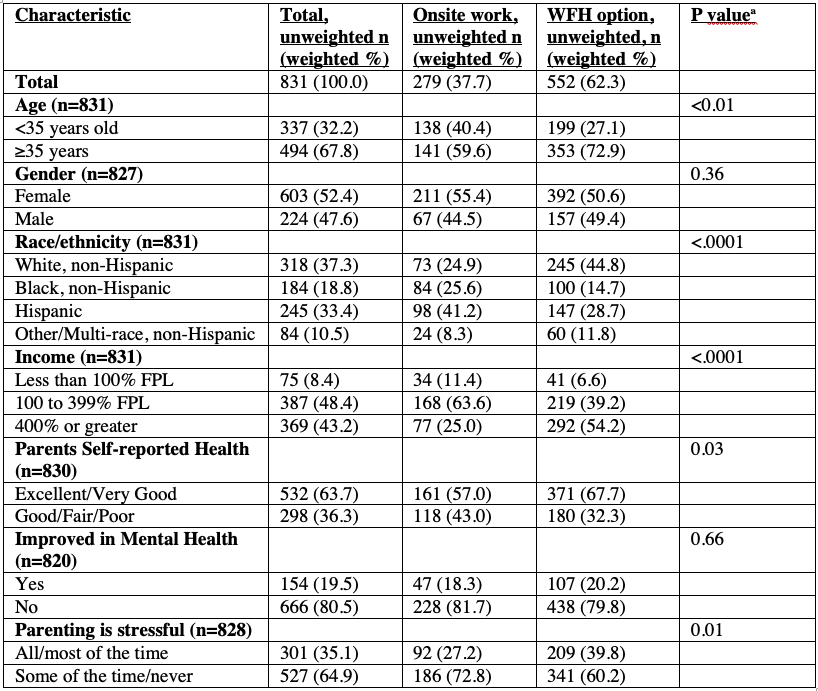Health Services Research
HSR 2: Clinical Explorations, Associations, and Interventions
597 - Working from Home and the Health of Parents in Chicago
Publication Number: 597.223

John James F. Parker, MD (he/him/his)
Health Services Research Fellow
Ann & Robert H. Lurie Children's Hospital of Chicago
Lake Bluff, Illinois, United States
Presenting Author(s)
Background: The COVID-19 pandemic changed workstyle, with increased availability to work remotely, i.e., work from home (WFH). Previous studies have found positive and negative associations between health and WFH availability, with the association varying based on demographic and socioeconomic characteristics. It is unknown if the ability to WFH during the first two years of the COVID-19 pandemic is associated with health benefits for working parents.
Objective:
To examine associations between parents’ general health, mental health and parenting stress with WFH during the COVID-19 pandemic.
Design/Methods:
Survey data were collected from May-July 2022 through the Voices of Child Health in Chicago Parent Panel Survey, administered tri-annually to parents from all 77 neighborhoods in Chicago. The variables, questions, and categorization for WFH, general parental health, improved mental health and parenting stress are detailed in Table 1. We conducted chi-squared analysis and utilized multivariable logistic regression to estimate odd ratios. Our covariates in included age, race/ethnicity, gender, and income. Analyses were weighted to be representative of Chicago parents.
Results: Among the 1068 parent respondents, 835 (75%) were employed at the time of the survey administration, 494 (68%) were ≥ 35 years old, 603 (52%) were female and 552 (62%) employed parents had a WFH option. Non-Hispanic Black parents and parents with income level of < 100% Federal Poverty Line (FPL) or 100-400% FPL were less likely to have a WFH option than non-Hispanic White parents and parents with income ≥400% FPL, respectively (p< .0001) (Table 2). In unadjusted models, a WFH option was associated with very good/excellent general parental health (p=0.03) and more parenting stress (p=0.01), but not associated with improved mental health (p=0.66) (Table 2). In adjusted models, those with a WFH option reported higher levels of parenting stress (aOR=1.9; 95% CI 1.2-2.9), but no reported difference in general health status (aOR=1.3, 95% CI 0.8-2.0) or improved mental health (aOR=1.2; 95%CI 0.7-2.1) compared with onsite work (Table 3). When stratified by gender, there remained no difference between WFH and general health or improved mental health (Table 3).
Conclusion(s): During the COVID-19 pandemic, parents in Chicago who had a WFH option report higher rates of parenting stress but no difference in general health or mental health. As workstyles continue to evolve, researchers and health professionals should continue to assess the relationship between WFH, parenting stress, and the health of parents and their children. 

.png)
